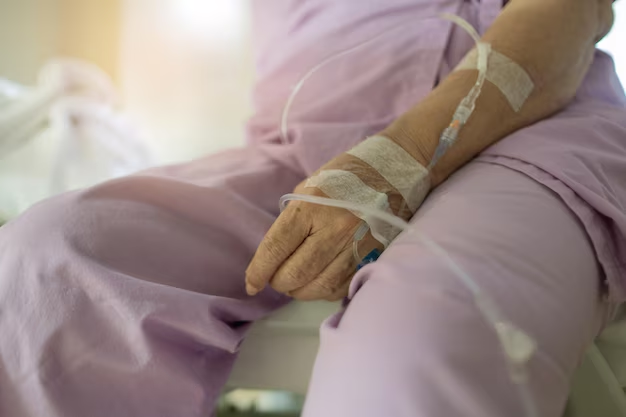Your Guide to Are Chemotherapy Drugs Covered By Medicare Part d
What You Get:
Free Guide
Free, helpful information about Medicare Insurance and related Are Chemotherapy Drugs Covered By Medicare Part d topics.
Helpful Information
Get clear and easy-to-understand details about Are Chemotherapy Drugs Covered By Medicare Part d topics and resources.
Personalized Offers
Answer a few optional questions to receive offers or information related to Medicare Insurance. The survey is optional and not required to access your free guide.
Are Your Chemotherapy Drugs Covered by Medicare Part D? Here's What to Know
Navigating healthcare coverage can be complex, especially when dealing with a chronic illness such as cancer. One pressing question many face is: Are chemotherapy drugs covered by Medicare Part D? Understanding this can help alleviate some financial stress and allow patients to focus on their recovery journey. Let’s explore this critical issue in more detail.
Understanding Medicare Part D Coverage
Medicare Part D is a prescription drug plan designed to supplement Original Medicare (Parts A and B), covering a wide range of prescription medications, including those required for chemotherapy treatment. Typically, Part D plans cover oral chemotherapy drugs—those that can be taken by mouth—which are increasingly common in cancer treatment regimens. However, the specifics can vary based on the plan.
While Medicare Part B covers chemotherapy drugs administered through the vein, such as those given via infusion at a doctor's office or hospital, Medicare Part D steps in primarily for self-administered prescriptions. Knowing which part covers your medication can make a significant difference in managing out-of-pocket expenses.
What to Do When Costs Become Overwhelming
High costs of chemotherapy drugs can quickly become a burden. If you find yourself struggling with these expenses, it's important to know that several financial assistance options are available:
- Extra Help Program: This is a federal program providing assistance to Medicare beneficiaries with limited income and resources. It helps with premiums, deductibles, and copayments related to Medicare Part D.
- Patient Assistance Programs (PAPs): Many pharmaceutical companies have PAPs that offer free or discounted drugs to individuals who cannot afford their medication.
- State Pharmaceutical Assistance Programs (SPAPs): Depending on your state, there might be additional assistance available to help manage the costs of prescription drugs, including chemotherapy.
Exploring Broader Financial Solutions
Beyond insurance coverage, there are additional pathways to ease financial burdens from healthcare costs, stretching beyond just the realm of chemotherapy drugs:
- Credit Counseling Services: These organizations provide budgeting help and may suggest debt management plans that could lower monthly payments and interest rates.
- Debt Relief Options: In instances of overwhelming debt, exploring options like debt consolidation or settlement might provide a solution, allowing a more manageable payment structure.
- Government Grants and Tax Benefits: Some healthcare-related grants are available at federal or state levels, while tax deductions for medical expenses can also bring some relief.
- Educational Grants or Scholarships: For those impacted by cancer, there are educational grants available to either the patient or their family, supporting educational pursuits while managing healthcare challenges.
The goal is to alleviate some of your financial stressors, allowing you to concentrate on health and healing rather than debt and payments.
Final Thoughts
While Medicare Part D offers critical coverage for oral chemotherapy drugs, the financial landscape can still feel daunting. Being aware of the available financial assistance programs and exploring broader debt relief and financial solutions can make managing healthcare costs more feasible.
Here are some key programs and resources to consider:
- 💊 Extra Help (Low-Income Subsidy)
- 🎗️ Patient Assistance Programs (PAPs)
- 🌍 State Pharmaceutical Assistance Programs (SPAPs)
- 💳 Credit Counseling Services
- 📉 Debt Relief and Consolidation Options
- 🎓 Educational Grants and Scholarships for Cancer Patients and Families
Careful planning and leveraging these resources can aid in effectively managing the costs associated with chemotherapy and maintaining peace of mind during treatment.
What You Get:
Free Medicare Insurance Guide
Free, helpful information about Are Chemotherapy Drugs Covered By Medicare Part d and related resources.

Helpful Information
Get clear, easy-to-understand details about Are Chemotherapy Drugs Covered By Medicare Part d topics.

Optional Personalized Offers
Answer a few optional questions to see offers or information related to Medicare Insurance. Participation is not required to get your free guide.


Discover More
- Am I Elgible For Medicare
- Am I Enrolled In Medicare
- Am I Qualified For Medicare
- Are Adult Diapers Covered By Medicare
- Are Colonoscopies Covered By Medicare
- Are Covid Tests Covered By Medicare
- Are Cpap Machines Covered By Medicare
- Are Cpap Supplies Covered By Medicare
- Are Dental Implants Covered By Medicare
- Are Dentures Covered By Medicare
